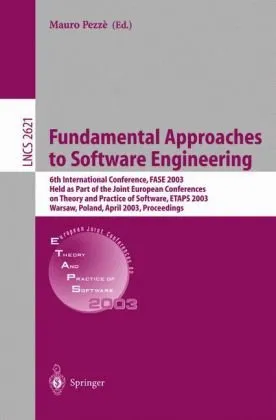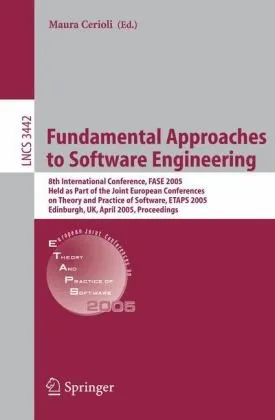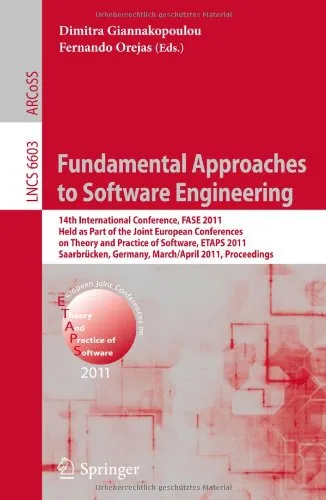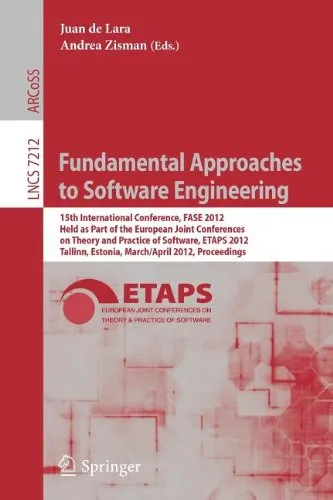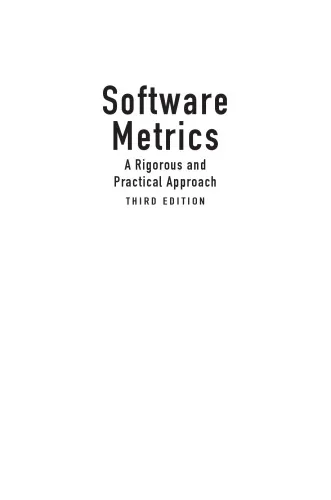Fundamental Approaches to Software Engineering: 10th International Conference, FASE 2007, Held as Part of the Joint European Conferences, on Theory and Practice of Software, ETAPS 2007, Braga, Portugal, March 24 - April 1, 2007. Proceedings
4.5
بر اساس نظر کاربران

شما میتونید سوالاتتون در باره کتاب رو از هوش مصنوعیش بعد از ورود بپرسید
هر دانلود یا پرسش از هوش مصنوعی 2 امتیاز لازم دارد، برای بدست آوردن امتیاز رایگان، به صفحه ی راهنمای امتیازات سر بزنید و یک سری کار ارزشمند انجام بدینکتاب های مرتبط:
معرفی کتاب
کتاب "Fundamental Approaches to Software Engineering: 10th International Conference, FASE 2007" که به طور خاص به کنفرانس بینالمللی دهم FASE و همایشهای مشترک اروپایی در نظریه و مهندسی نرمافزار تعلق دارد، یکی از معتبرترین و جامعترین منابع در زمینه مهندسی نرمافزار به شمار میرود. این کتاب بهعنوان مجموعه مقالات کنفرانس برگزارشده در براگا، پرتغال در سال ۲۰۰۷، دستاوردهای پیشرفته و نوین در حوزه روشهای پایهای مهندسی نرمافزار را ارائه میدهد. ویرایشگران این کتاب، Matthew B. Dwyer و Antónia Lopes، با دقت بسیار تلاش کردهاند تا تحقیقات برجسته ارائهشده در این همایش را جمعآوری و سازماندهی کنند.
این کتاب تمرکز ویژهای بر روشها و چارچوبهای نظری مهندسی نرمافزار دارد و درک عمیقی از فرآیندهای توسعه نرمافزار مدرن ارائه میدهد. مباحث متنوعی از جمله تجزیهوتحلیل نرمافزار، testing، verification، و طراحی معماری نرمافزار در این اثر مورد بحث قرار گرفتهاند.
خلاصهای از کتاب
کتاب شامل بخشهای متنوعی است که به موضوعات کلیدی در مهندسی نرمافزار میپردازد. برخی از این موضوعات به شرح زیر هستند:
- ارائه روشهای جدید در Model Checking و بررسی صحت برنامهها
- استفاده از formal methods برای افزایش دقت در طراحی نرمافزار
- تطبیق و تحلیل عملکرد سیستمهای نرمافزاری پیچیده
- معرفی تکنیکهای پیشرفته در Software Testing برای بهینهسازی فرآیند تضمین کیفیت
- تحقیقات جدید در پیکربندی سیستمها و کاهش پیچیدگی معماری
این اثر، مجموعهای از مطالعات تحقیقاتی و پروژههای دانشمندان برجسته از سراسر جهان را به نمایش میگذارد. همچنین، این کتاب در بررسی چگونگی استفاده از روشهای رسمی در فرآیندهایی که شامل سیستمهای تعاملی، توزیعی و همگام هستند، نقش مهمی دارد.
نکات کلیدی کتاب
از کتاب FASE 2007 میتوان نکات زیر را فرا گرفت:
- فهم عمیقتر از اهمیت formal verification در تضمین کیفیت نرمافزار
- مروری بر روشهای نوآورانه در Static Analysis برای کشف خطا در مراحل اولیه توسعه
- روشهای بهرهبرداری از Dynamic Modelling در بهبود قابلیت اطمینان سیستمها
- ایجاد ارتباط میان مفهومهای نظری و کاربرد واقعی در صنعت نرمافزار
جملات معروف از کتاب
این کتاب به دلیل ارزش بالای علمی و مباحث قابل استدلال خود، حاوی عبارات قابلتأملی است. در اینجا به برخی از آنها اشاره میکنیم:
"Bridging theory and practice in software engineering is not a luxury; it is a necessity."
"Testing reveals the presence of defects, not their absence - a fundamental truth in software engineering."
جملات فوق بر اهمیت پیوند بین تئوری و عمل در مهندسی نرمافزار تأکید کرده و نقش testing در بهبود کیفیت نرمافزار را مطرح میکنند.
چرا این کتاب مهم است؟
کتاب FASE 2007 یکی از آثار مهم در زمینه ادبیات مهندسی نرمافزار است زیرا:
- تحصیلات و پژوهش در حوزه Software Engineering را به سطح بالاتری ارتقا میدهد.
- یک نگاه جامع و مبتنی بر پژوهش به چالشها و فرصتهای پیشروی مهندسین نرمافزار را ارائه میدهد.
- مناسب برای دانشجویان و پژوهشگران علاقهمند به موضوعات پیشرفته و تکنیکهای نوین مهندسی نرمافزار است.
- اطلاعاتی جامع و کاربردی در مورد formal methods و سایر تکنیکهای ارتقای سیستم ارائه میکند.
این کتاب نهتنها دانش تکنیکی عمیقی را به خوانندگان منتقل میکند، بلکه با فراهم کردن بستر درک نظری، به آنها کمک میکند تا مسائل پیچیده نرمافزاری را با رویکردهای نوآورانه حل کنند.
Introduction to "Fundamental Approaches to Software Engineering: FASE 2007"
Software engineering has grown exponentially in complexity and importance in recent decades, necessitating robust methodologies, tools, and practices. The book "Fundamental Approaches to Software Engineering" (FASE 2007) is a meticulously curated collection of research and insights presented at the 10th International Conference on Fundamental Approaches to Software Engineering. This event was held as part of the European Joint Conferences on Theory and Practice of Software (ETAPS 2007), a leading platform for fostering innovation in software engineering. Hosted in the beautiful city of Braga, Portugal, the conference brought together some of the brightest minds in the field, culminating in a publication that is as academically rich as it is practically applicable.
The book captures the cutting-edge advancements shared during the event, focusing on theoretical frameworks, practical techniques, and tool support for constructing high-quality software systems. It serves as an essential resource for researchers, practitioners, and students who are navigating the evolving landscape of software engineering. By bringing together a diverse range of topics, the book highlights the importance of integrating theoretical understanding with real-world applicability.
Detailed Summary
This book is organized into carefully selected contributions that reflect the current state of the art in software engineering. It encompasses a variety of areas, including formal methods, software design, analysis techniques, verification, testing, and optimization. Each paper included in these proceedings enriches the discourse with innovative approaches and case studies that address the challenges of creating reliable, scalable, and maintainable software.
Some notable highlights include discussions on model-driven development, automated verification techniques, and dynamic program analysis. The interplay between formal methods and practical applications is a recurrent theme, illustrating how rigorous analysis can lead to actionable improvements in software quality. The integration of domain-specific modeling, advanced type systems, and scalable algorithms finds a prominent place, ensuring balance between innovation and feasibility.
FASE 2007 also looks ahead at trends such as the rise of concurrent and distributed systems, and explores formal approaches to address their complexity. By combining theoretical depth with practical insights, this book equips readers with tools and methodologies that are not just forward-looking but also grounded in real-world utility.
Key Takeaways
- An in-depth exploration of fundamental methods such as formal modeling, verification, and testing in software engineering.
- Insights into the challenges facing modern software development, including concurrency, scalability, and dynamic systems.
- Application of theory in practice, showcasing case studies and tools that support improved software quality.
- Emerging research topics, including the evolution of programming paradigms and their implications on system design.
- A broad perspective on how software engineering interfaces with other disciplines, including mathematics, logic, and human-computer interaction.
Famous Quotes from the Book
"Software engineering is not merely about building systems that work; it is about building systems that last, adapt, and inspire confidence in their users."
"The integration of formal methods with practical tools is the key to bridging the gap between theoretical soundness and industrial applicability."
Why This Book Matters
"Fundamental Approaches to Software Engineering: FASE 2007" isn't just a record of a conference; it is a testament to the innovative spirit of the software engineering community. The book chronicles advancements that have undoubtedly shaped modern software development practices, laying the foundation for future breakthroughs. By addressing foundational issues alongside practical challenges, it serves as a timeless reference for those in academia and industry alike.
The book's multi-disciplinary approach is one of its key strengths. It doesn't just focus on software systems in isolation; instead, it places them within the broader context of computer science, mathematics, and engineering. This perspective is particularly important in today's interconnected world, where robust and adaptable software systems form the backbone of industries, governments, and everyday life.
For researchers, the book provides a treasure trove of ideas that have inspired further inquiry and innovation. For practitioners, it offers methodologies and tools that can be directly applied to improve software quality. For students, it is an invaluable resource for understanding the theoretical underpinnings that support good software development practices.
In short, "Fundamental Approaches to Software Engineering: FASE 2007" is a must-read for anyone who wants to contribute to or understand the state of modern software engineering. Its combination of depth, breadth, and real-world relevance ensures that it continues to be a valuable resource for years to come.
دانلود رایگان مستقیم
شما میتونید سوالاتتون در باره کتاب رو از هوش مصنوعیش بعد از ورود بپرسید
دسترسی به کتابها از طریق پلتفرمهای قانونی و کتابخانههای عمومی نه تنها از حقوق نویسندگان و ناشران حمایت میکند، بلکه به پایداری فرهنگ کتابخوانی نیز کمک میرساند. پیش از دانلود، لحظهای به بررسی این گزینهها فکر کنید.
این کتاب رو در پلتفرم های دیگه ببینید
WorldCat به شما کمک میکنه تا کتاب ها رو در کتابخانه های سراسر دنیا پیدا کنید
امتیازها، نظرات تخصصی و صحبت ها درباره کتاب را در Goodreads ببینید
کتابهای کمیاب یا دست دوم را در AbeBooks پیدا کنید و بخرید
1223
بازدید4.5
امتیاز0
نظر98%
رضایتنظرات:
4.5
بر اساس 0 نظر کاربران
Questions & Answers
Ask questions about this book or help others by answering
No questions yet. Be the first to ask!
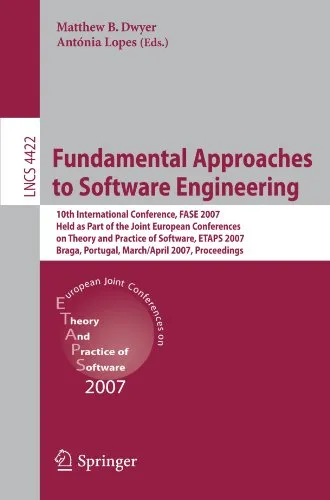

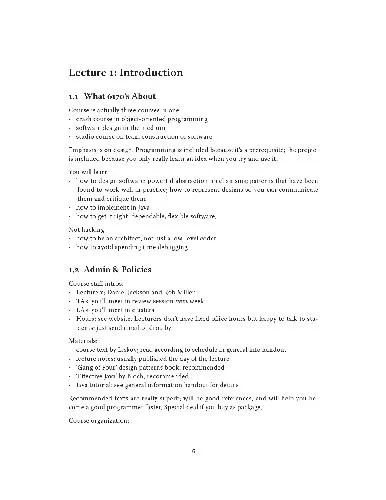

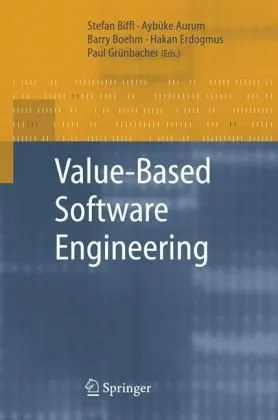

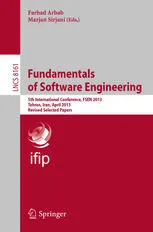
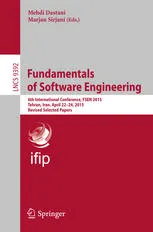
![Fundamentals Of Software Engineering, 5Th Ed [Paperback] Mall](https://s3.refhub.ir/images/thumb/Fundamentals_Of_Software_Engineering__5Th_Ed__31573.webp)
